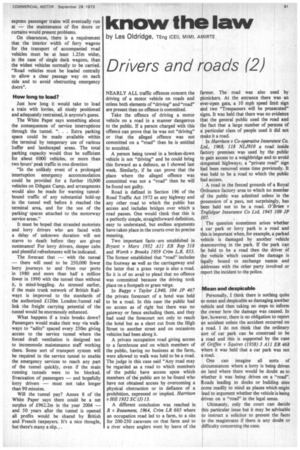know Ih law
Page 63

If you've noticed an error in this article please click here to report it so we can fix it.
by Les Oldridge, TEng (CEO, MIMI, AMIRTE
Drivers and roads (2)
NEARLY ALL traffic offences concern the driving of a motor vehicle on roads and unless both elements of "driving" and "road" are present then no offence is committed.
Take the offence of driving a motor vehicle on a road in a manner dangerous to the public. If a person charged with this offence can prove that he was not "driving" or that the alleged offence was not committed on a "road" then he is entitled to acquittal.
A person being towed in a broken-down vehicle is not "driving" and he could bring this forward as a defence, as I showed last week. Similarly, if he can prove that the place where the alleged offence was committed was not a "road" then he will be found not guilty.
Road is defined in Section 196 of the Road Traffic Act 1972 as any highway and any other road to which the public has access and includes bridges over which a road passes. One would think that this is a perfectly simple, straightforward definition, easy to understand, but endless arguments have taken place in the courts over its precise meaning.
Two important facts are established in Bryant v Marx 1932 All ER Rep 518 and Worth v Brooks 1959 Crim L.R. 855, The former established that "road" includes the footway as well as the carriageway and the latter that a grass verge is also a road. So it is of no avail to plead that no offence was committed because the driving took place on a footpath or grass verge.
In Bugge v Taylor L940, 104 JP 467 the private forecourt of a hotel was held to be a road. In this case the public had no access as of right but there was no gateway or fence excluding them, and they had used the forecourt not only to reach the hotel but as a short cut from the High Street to another street and on occasions vehicles had been along it.
A private occupation road giving access to a farmhouse and on which members of the public, having no business at the farm, were allowed to walk was held to be a road. The judge in this case said "Any road may be regarded as a road to which members of the public have access upon which members of the public are to be found who have not obtained access by overcoming a physical obstruction or in defiance of a prohibition, expressed or implied. Harrison v Hill 1932 SC (J) 13.
A different conclusion was reached in R v Beaument, 1964, Crim LR 665 where an occupation road led to a farm, to a site for 200-250 caravans on that farm and to a river where anglers went by leave of the farmer. The road was also used by picnickers. At the entrance there was an ever-open gate, a 10 mph speed limit sign and two "Trespassers will be prosecuted" signs. It was held that there was no evidence that the general public used the road and the fact that a large number of persons of a particular class of people used it did not make it a road.
In Harrison v Co-operative Insurance Co. Ltd., 1968, 118 NLJ910 a road inside factory premises was used by the public to gain access to a weighbridge and to avoid congested highways; a "private road" sign had been removed some time previously. It was held to be a road to which the public had access.
A road in the fenced grounds of a Royal Ordnance factory area to which no member of the public was admitted unless in the possession of a pass, not surprisingly, has been held not to be a road. O'Brien v Trafalgar Insurance Co Ltd, 1945 109 JP 107.
The question sometimes arises whether a car park or lorry park is a road and this is important when, for example, a parked vehicle is damaged by another vehicle manoeuvring in the park. If the park can be held to be a road then the driver of the vehicle which caused the damage is legally bound to exchange names and addresses with the other party involved or report the incident to the police.
Mean and despicable Personally, I think there is nothing quite ao mean and despicable as damaging another vehicle and then taking no steps to inform the owner how the damage was caused. In law, however, there is no obligation to report an accident unless the accident occurred on a road. I do not think that the ordinary sort of car park can he construed to be a road and this is supported by the case of Griffen v Squire,s (1958) 3 All ER 468 where it was held that a car park was not a road.
One can imagine all sorts of circumstances where a lorry is being driven on land where there would be doubt as to whether it was being driven on a "road". Roads leading to docks or building sites come readily to mind as places which might lead to argument whether the vehicle is being driven on a "road" in the legal sense.
Ultimately, only the court can decide this particular issue but it may be advisable to instruct a solicitor to present the facts to the magistrates if there is any doubt or difficulty concerning the case.












































































































